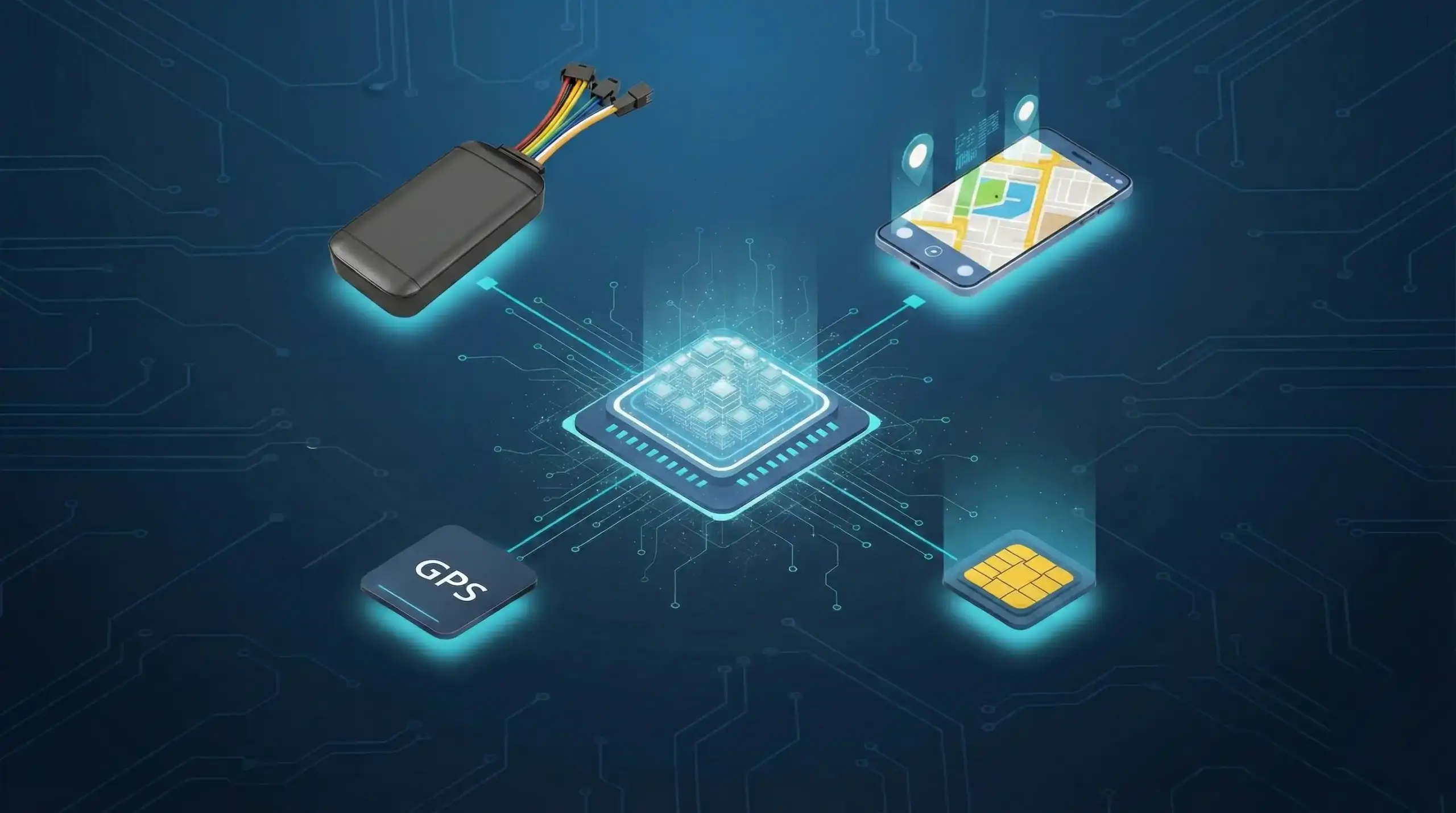Compreendendo a IoT no gerenciamento de frotas
A Internet dos Pontos (IoT) significa uma rede de dispositivos adjacentes que se comunicam e compartilham informações entre si. No contexto da gestão de frotas, A tecnologia IoT integra vários elementos, como unidades de detecção, Dispositivos GPS, e sistemas de software para produzir um sistema extenso que monitora, avalia, e melhora os procedimentos da frota. Ao aproveitar esta rede adjacente, os supervisores de frota podem alcançar um maior grau de controle e exposição sobre seus veículos e bens, melhorando significativamente as habilidades anti-roubo para caminhões.
Entre as tecnologias base em IoT para gestão de frotas está o rastreador GPS. Dispositivos como o rastreador GPS Protrack são essenciais para monitoramento de locais em tempo real, Otimização do caminho, e gestão de posse. Esses rastreadores enviam continuamente informações sobre o local para sistemas como o sistema GPS Protrack365, que depois disso processa e avalia essas informações, fornecendo entendimentos críticos sobre a eficiência do veículo, Hábitos do motorista, e eficácia geral da frota. A integração dessas tecnologias permite uma coleta e gerenciamento fáceis de informações, oferecendo uma ampla visão dos procedimentos da frota, e funcionando como um dispositivo confiável de monitoramento anti-roubo para carros. Adicionalmente, monitoramento específico de reboque por GPS garante segurança para cargas valiosas.
Atualmente, A promoção da IoT na gestão de frotas está melhorando constantemente à medida que as empresas reconhecem seus benefícios potenciais. A eficácia melhorada é apenas um dos benefícios mais consideráveis, já que a IoT permite que os supervisores de frota melhorem os procedimentos, otimizar rotas, e diminuir o tempo de inatividade. A redução de custos é mais um benefício crítico; com informações em tempo real, as empresas podem minimizar o consumo de combustível, diminuir custos de manutenção, e prolongar a vida útil dos seus veículos. Além disso, A IoT aumenta a segurança ao monitorar os hábitos dos motoristas, determinando padrões de risco, e fornecendo notificações imediatas para evitar acidentes, ao mesmo tempo que reforça o combate ao roubo de títulos de caminhões.
À medida que o cenário da IoT continua a se desenvolver, suas aplicações na gestão de frotas estão se ampliando. Da antecipação da manutenção à cobertura automatizada de conformidade, A IoT está mudando a forma como as frotas funcionam. Ao aceitar tecnologias IoT como o sistema GPS Protrack365 e rastreadores GPS Protrack, supervisores de frota podem abrir novos graus de eficácia funcional, Poupança de custos, e segurança, colocando as suas frotas para um sucesso duradouro num mercado cada vez mais acessível, ao mesmo tempo em que fornece dispositivo avançado de monitoramento anti-roubo para desempenho de carros e monitoramento seguro de reboques por GPS.
Principais tecnologias IoT para gerenciamento de frotas
Efficient fleet management is progressively dependent on the integration of specific IoT technologies that provide real-time information and workable understandings. Amongst these technologies, GPS monitoring systems, dispositivos telemáticos, e diagnóstico a bordo (OBD) devices play critical functions in enhancing fleet procedures and improving anti burglary for truck security.
Among the foundation technologies in fleet management is the GPS monitoring system. Systems such as Protrack365 GPS system offer advanced monitoring abilities, enabling fleet supervisors to monitor vehicle locations and movements in real-time. The Protrack GPS tracker not just provides place information but also integrates with various other systems to offer extensive understandings into chauffeur habits, Otimização do caminho, and fuel effectiveness, funcionando como um dispositivo eficiente de monitoramento anti-roubo para carros e um importante localizador de reboques por GPS.
Os dispositivos telemáticos são outro elemento essencial na gestão de frotas. Esses dispositivos reúnem uma grande variedade de fatores de informação relacionados à eficiência do veículo e aos hábitos do motorista.. Ao transmitir informações sobre velocidade, parando, velocidade, e consumo de combustível, dispositivos telemáticos dão aos supervisores de frota a capacidade de analisar e melhorar os métodos de condução, diminuir os custos funcionais, e melhorar os procedimentos de segurança. A integração da informação telemática com o software de gestão de frotas ajuda ainda mais a antecipar a manutenção e a eficácia funcional, melhorando significativamente as medidas anti-roubo para caminhões.
Diagnóstico a bordo (OBD) dispositivos complementam o desempenho dos sistemas GPS e telemáticos, fornecendo informações detalhadas sobre a saúde e o bem-estar dos veículos. Dispositivos OBD podem monitorar várias especificações do motor, detectar erros, e alertar os supervisores da frota sobre possíveis problemas de manutenção antes que se tornem críticos. Esta abordagem positiva à manutenção dos veículos garante um tempo de inatividade mínimo e prolonga a esperança de vida dos bens da frota, produção da frota muito menos vulnerável a roubos e um dispositivo de monitoramento anti-roubo mais durável para posse de carros.
A harmonia destas tecnologias IoT é melhorada quando incorporadas com um extenso software de gestão de frotas. Esses sistemas de software reúnem informações do GPS, telemática, e dispositivos OBD, oferecendo um painel de controle combinado para avaliação e tomada de decisão. Esta visão alternativa permite que os supervisores de frota tomem decisões informadas, otimizar rotas, gerenciar o consumo de combustível, e garantir a manutenção imediata, eventualmente melhorando a eficácia e eficiência dos procedimentos da frota, juntamente com recursos anti-roubo eficazes para recursos de segurança de caminhões e reboques GPS.
Implementando soluções IoT em sua frota
A implementação de soluções IoT na gestão de frotas começa com uma avaliação abrangente das necessidades específicas da sua frota. Compreender esses requisitos é crucial para escolher os dispositivos e software IoT certos. Comece por avaliar a dimensão da sua frota, os tipos de veículos que você dirige, e as principais métricas que você pretende monitorar, como o consumo de combustível, eficácia do caminho, e rotinas de manutenção, consistindo em soluções anti-roubo duráveis para caminhões.
Uma vez que as necessidades são claramente especificadas, a próxima etapa é escolher os dispositivos e sistemas IoT apropriados que se alinhem com esses requisitos. Para circunstâncias, o sistema GPS Protrack365 é um serviço extenso que oferece recursos avançados de monitoramento, análise de informações em tempo real, e integração suave com vários dispositivos IoT. A escolha de um sistema durável como o Protrack365 garante que você tenha uma estrutura confiável para seus procedimentos de gerenciamento de frota, consistindo em monitoramento detalhado para unidades de reboque GPS.
O processo de instalação envolve equipar cada veículo com os dispositivos IoT selecionados, como o rastreador GPS Protrack. Esses dispositivos devem ser instalados por especialistas qualificados para garantir precisão e confiabilidade. A instalação adequada é fundamental para capturar informações precisas e evitar possíveis problemas no futuro, e garantir a eficácia do dispositivo de monitorização anti-roubo para automóveis. Após a instalação, a integração do sistema é o próximo passo crucial. Isso envolve conectar os dispositivos IoT ao sistema principal, garantindo que os fluxos de informações sejam sincronizados e acessíveis em tempo real, fornecendo amplo sistema anti-roubo para monitoramento de caminhões.
A configuração inicial do sistema consiste em configurar o software de acordo com os requisitos específicos da sua frota. Isso pode envolver o estabelecimento de cercas geográficas, especificando especificações de alerta, e personalização de painéis para exibir uma das informações mais adequadas. É essencial realizar testes abrangentes ao longo desta fase para determinar e corrigir quaisquer problemas antes da implementação completa, garantindo que seu trailer GPS esteja constantemente seguro.
Garantir a precisão e a confiabilidade das informações é um processo contínuo. Calibre e mantenha regularmente os dispositivos IoT para evitar inconsistências. A implementação dos melhores métodos, como auditorias regulares e inspeções de reconhecimento de informações, pode ajudar a manter a integridade das informações.. Além disso, educar a equipe para utilizar efetivamente as novas tecnologias é fundamental. Programas educativos extensivos devem abranger tanto os aspectos funcionais dos dispositivos IoT como os dispositivos lógicos fornecidos pelo sistema. This ensures that the group is fully equipped to take advantage of the complete potential of the Protrack365 GPS system, production it an effective anti burglary monitoring device for cars.
Maximizando os benefícios da IoT para gerenciamento de frotas
No mundo da gestão da frota, the integration of IoT technologies provides vast opportunities to improve functional effectiveness and decrease costs. Leveraging information from the Protrack365 GPS system can significantly add to anticipating upkeep. By constantly monitoring vehicle health and wellness metrics such as engine temperature level, graus de óleo, and tire stress, fleet supervisors can preemptively address problems before they intensify into expensive repairs or break downs. This positive approach ensures that the fleet remains in ideal problem, reducing downtime and extending the life expectancy of the vehicles, ao mesmo tempo que melhora as medidas anti-roubo para caminhões.
A otimização do caminho é mais um local crítico
onde a IoT pode causar um impacto considerável. Utilizando informações de rastreadores GPS Protrack, supervisores de frota podem analisar padrões de tráfego, Problemas de estrada, e localizações de veículos em tempo real. Esta informação permite a modificação vibrante de rotas para evitar bloqueios, diminuir o tempo de viagem, e melhorar a eficácia do combustível. O planejamento aprimorado do caminho não apenas melhora os prazos de entrega, mas também reduz os custos funcionais e aumenta a satisfação do cliente, sustentar o papel de cada dispositivo de monitoramento anti-roubo para carros.
Monitorar os hábitos dos motoristas é essencial para preservar uma frota eficiente e livre de riscos. Unidades de detecção IoT e rastreadores GPS fornecem informações valiosas sobre padrões de direção, como acelerar, parada severa, e ocioso. Ao avaliar esta informação, fleet supervisors can determine locations for improvement and implement targeted educating programs to advertise safer driving practices. This not just decreases the risk of accidents but also adds to better fuel economic climate and lower upkeep costs, and enhances anti burglary for truck strategies.
Instances of effective IoT applications in fleet management are plentiful. Companies that have adopted the Protrack365 GPS system record considerable improvements in functional effectiveness and cost savings. Para circunstâncias, a logistics company using IoT for path optimization saw a 20% decrease in fuel consumption, while another firm utilizing anticipating upkeep skilled a 25% diminuição do tempo de inatividade do veículo. These companies also take advantage of superior gps trailer monitoring.
Olhando com antecedência, o futuro da IoT na gestão de frotas é promissor. Arising trends such as advanced analytics, artificial intelligence, e veículos autônomos estão preparados para transformar a indústria. Para ficar à frente do contorno, os supervisores de frota devem desenvolver e atualizar continuamente seus sistemas IoT, garantindo que eles aproveitem as tecnologias mais recentes para manter uma vantagem, melhorando assim o dispositivo de monitoramento anti-roubo para carros e soluções anti-roubo para caminhões.









